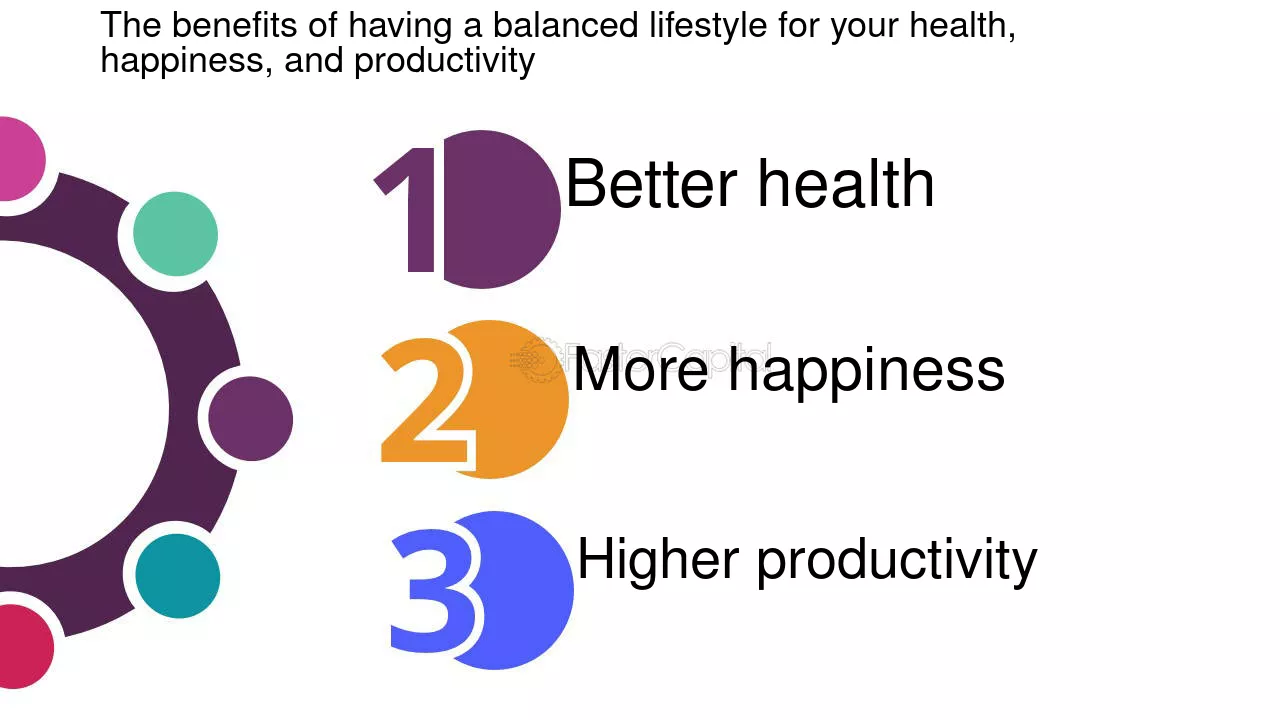The Ultimate Guide to a Balanced Lifestyle: A Path to Health, Happiness, and Success. In today’s fast-paced world, the concept of a balanced lifestyle is more important than ever. Many of us juggle demanding careers, personal relationships, health goals, and leisure activities, often feeling like there’s never enough time to balance it all. However, adopting a healthy lifestyle is not just about organizing your time better; it’s about nurturing your mind, body, and soul to achieve long-term happiness and well-being. This article delves into the essentials of a balanced lifestyle, covering key areas such as physical health, mental well-being, relationships, work-life harmony, and personal growth.
What is a Balanced Lifestyle?
A balanced lifestyle refers to an approach to living that prioritizes health, well-being, and personal fulfillment. It involves finding harmony across all aspects of life, including work, family, health, and leisure. A well-balanced life doesn’t mean achieving perfection in every area, but rather creating a routine that meets your needs and aligns with your values.
Key components of a balanced lifestyle include:
- Physical health: Regular exercise, nutritious eating, and adequate sleep.
- Mental health: Stress management, mindfulness, and emotional resilience.
- Relationships: Strong connections with family, friends, and your community.
- Personal growth: Pursuing hobbies, learning new skills, and achieving personal goals.
Physical Health: The Foundation of a Balanced Lifestyle
Your physical health is the cornerstone of a balanced lifestyle. Without a healthy body, it becomes challenging to excel in other areas of life.
Nutrition
Eating a balanced diet is essential for maintaining energy, preventing diseases, and improving your mood. A healthy diet should include:
- Whole foods: Fruits, vegetables, whole grains, and lean proteins.
- Hydration: Drinking enough water throughout the day.
- Moderation: Avoiding processed foods and excessive sugar.
Exercise
Regular physical activity helps improve both physical and mental health. Aim for at least 150 minutes of moderate-intensity exercise per week, which could include:
- Cardiovascular activities like jogging or cycling.
- Strength training to build muscle and improve bone health.
- Yoga or stretching exercises to enhance flexibility and reduce stress.
Sleep
Quality sleep is often overlooked but is vital for maintaining energy and focus. Adults should aim for 7-9 hours of sleep per night. Tips for better sleep include:
- Creating a consistent sleep schedule.
- Avoiding screens before bed.
- Practicing relaxation techniques like deep breathing.
Mental Well-being: Nurturing Your Mind
Mental health is just as important as physical health in achieving a balanced It involves managing stress, staying positive, and maintaining emotional stability.
Stress Management
Chronic stress can lead to physical and emotional burnout. To manage stress effectively:
- Practice mindfulness meditation to stay present and calm.
- Organize your tasks using prioritization techniques like the Eisenhower Matrix.
- Take breaks throughout the day to recharge.
Positive Thinking
Cultivating a positive mindset can enhance your overall outlook on Ways to foster positivity include:
- Keeping a gratitude journal.
- Surrounding yourself with supportive people.
- Reframing challenges as opportunities for growth.
Mental Resilience
Building mental resilience helps you handle adversity with confidence. Strengthen your resilience by:
- Setting realistic goals and celebrating small wins.
- Practicing self-compassion and forgiving yourself for mistakes.
- Seeking professional help if needed, such as therapy or counseling.
Relationships: Building Strong Connections
Humans are social beings, and relationships play a significant role in our happiness and well-being. Investing time in building and maintaining healthy relationships is crucial.
Family and Friends
Strong relationships with family and friends provide emotional support and a sense of belonging. To nurture these connections:
- Schedule regular quality time, like family dinners or coffee dates.
- Communicate openly and listen actively.
- Resolve conflicts with empathy and understanding.
Community
Being part of a community fosters a sense of purpose. Ways to engage include:
- Volunteering for a cause you care about.
- Joining clubs or groups that align with your interests.
- Attending local events or workshops.
Romantic Relationships
For those in romantic partnerships, maintaining a healthy relationship requires effort and commitment. Focus on:
- Clear communication and expressing appreciation.
- Spending quality time together without distractions.
- Working through challenges as a team.
Work-Life Harmony: The Key to Avoiding Burnout
Balancing work and personal life is a challenge for many, but it’s essential for maintaining overall well-being.
Setting Boundaries
Creating clear boundaries between work and personal life can prevent burnout. Tips include:
- Turning off work notifications after office hours.
- Designating a specific workspace at home.
- Learning to say no to excessive demands.
Time Management
Effective time management allows you to make room for all aspects of your life. Strategies include:
- Using tools like calendars and to-do lists.
- Breaking tasks into smaller, manageable steps.
- Allocating time for relaxation and hobbies.
Finding Meaning in Work
Your career should align with your values and passions. If your current job doesn’t fulfill you, consider:
- Exploring new roles within your field.
- Pursuing further education or training.
- Transitioning to a career that excites you.
Personal Growth: Pursuing Your Passions
Personal growth is an ongoing journey that keeps life exciting and fulfilling. It’s about stepping out of your comfort zone and striving for continuous improvement.
Learning New Skills
Developing new skills boosts confidence and keeps your mind sharp. You can:
- Take online courses in areas like coding, cooking, or photography.
- Read books or listen to podcasts on topics of interest.
- Attend workshops or seminars.
Hobbies and Creativity
Engaging in hobbies allows you to express yourself and reduce stress. Whether it’s painting, gardening, or playing an instrument, find activities that bring you joy.
Setting Goals
Setting and achieving goals gives you a sense of purpose. Tips for effective goal-setting include:
- Using the SMART framework (Specific, Measurable, Achievable, Relevant, Time-bound).
- Breaking larger goals into smaller milestones.
- Reflecting on your progress regularly.
The Role of Leisure and Relaxation
Incorporating leisure into your routine is essential for recharging and maintaining a balanced lifestyle. Activities like traveling, watching movies, or spending time in nature can rejuvenate your spirit.
Travel and Exploration
Exploring new places broadens your perspective and provides a break from routine. Whether it’s a weekend getaway or an international trip, make time to travel.
Mindful Relaxation
Relaxation doesn’t always mean being idle. Mindful relaxation activities include:
- Reading a book or journaling.
- Practicing yoga or tai chi.
- Engaging in breathing exercises.
Overcoming Common Challenges
While striving for a balanced lifestyle, you may encounter obstacles. Here’s how to overcome them:
Lack of Time
- Focus on your priorities and delegate tasks when possible.
- Use the 80/20 rule: Identify the 20% of activities that yield 80% of the results.
- Limit time spent on non-essential activities like social media.
Procrastination
- Break tasks into smaller steps to make them more manageable.
- Set deadlines and hold yourself accountable.
- Reward yourself for completing tasks.
Self-Doubt
- Remind yourself of past successes to boost confidence.
- Surround yourself with supportive people who encourage you.
- Practice positive affirmations to combat negative thoughts.
Conclusion: Embracing a Lifestyle That Works for You
Living a balanced lifestyle is not about following a rigid formula; it’s about finding what works best for you. By prioritizing physical and mental health, fostering meaningful relationships, managing your time effectively, and pursuing personal growth, you can create a life that is fulfilling and harmonious.

